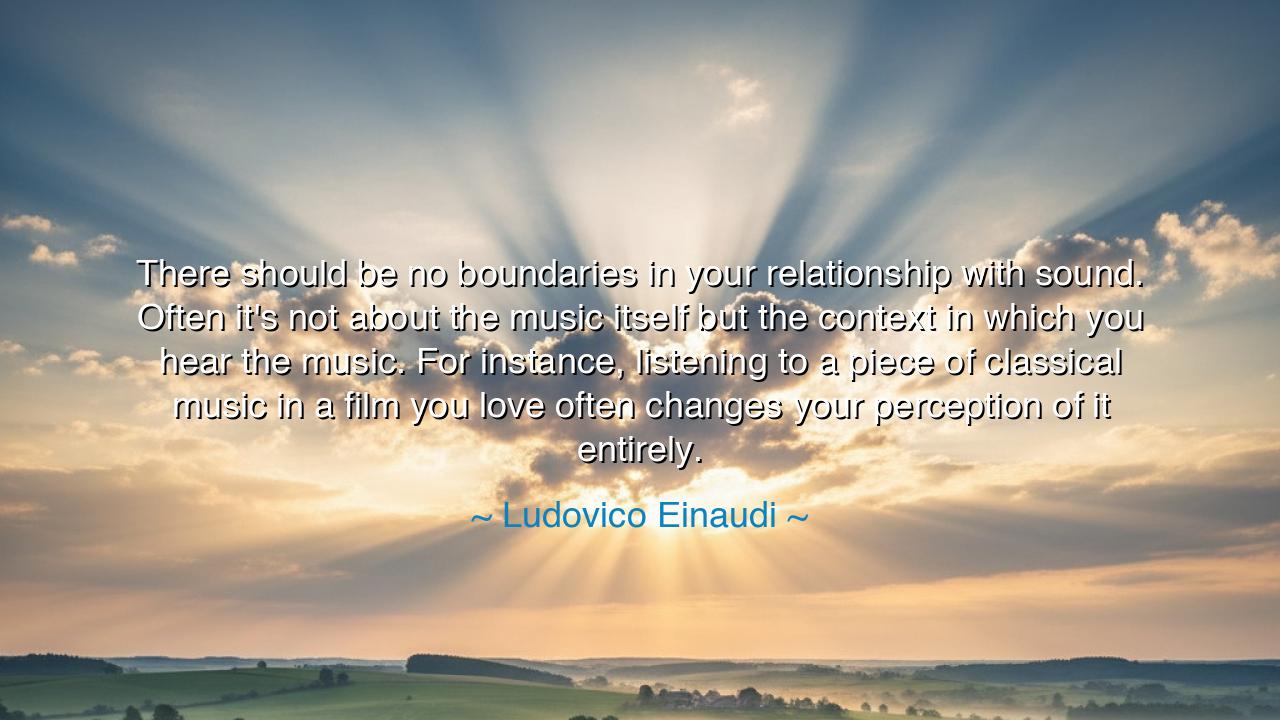
There should be no boundaries in your relationship with sound.
There should be no boundaries in your relationship with sound. Often it's not about the music itself but the context in which you hear the music. For instance, listening to a piece of classical music in a film you love often changes your perception of it entirely.






The master composer Ludovico Einaudi speaks with the voice of a sage when he proclaims: “There should be no boundaries in your relationship with sound. Often it’s not about the music itself but the context in which you hear the music. For instance, listening to a piece of classical music in a film you love often changes your perception of it entirely.” These words invite us to journey beyond the limits of form and genre, to see sound not as a fixed thing, but as a living force that flows through every corner of existence.
When he speaks of having no boundaries, Einaudi urges the soul to listen with openness and freedom. Too often, people cling to rules and labels, dividing music into categories of high and low, sacred and common, classical and modern. Yet sound, in its purest form, is beyond these divisions. Like the wind through the trees or the waves upon the shore, it belongs to no one realm. To set boundaries is to close the ears of the spirit, while to release them is to hear the universe itself.
He reminds us that context shapes our perception. A melody heard in isolation may move us little, but when entwined with memory, story, or image, it becomes something far greater. A piece of classical music may seem distant or cold until it is woven into the fabric of a beloved film, at which point it awakens emotion and meaning we never knew it held. Thus, music is not only sound, but experience; it is shaped by the time, place, and heart in which it is received.
The origin of this truth is ancient, for in every culture, sound has been more than mere vibration. It has been the voice of ritual, the heartbeat of community, the thread binding human stories together. The drums of the ancestors, the chants of the temples, the songs of wandering bards—all reveal that music is a bridge between worlds. Einaudi’s wisdom renews this ancient teaching for a modern age, reminding us that every note carries not only its own meaning but the echoes of the moment in which it is heard.
Thus, let this teaching guide future generations: approach sound with reverence and without limitation. Listen not only to the music, but to the life surrounding it, for in that union lies its truest power. When the heart hears without boundaries, every note becomes a pathway to deeper understanding, and even the simplest melody can move mountains within the soul.






DKtran dang khoi
Einaudi’s words really resonate with how we experience sound in daily life. The setting does transform how we perceive music, like hearing a song on a rainy day or in a lively crowd. But is there a danger in becoming too reliant on context for emotional meaning? If we always depend on external factors to elevate music, can we still find pure enjoyment when the context isn’t as rich? It’s an interesting balance to explore.
HYPhuong Hai Yen
I totally agree with the idea that music can have a completely different impact depending on the situation. Think about the effect of hearing a familiar song at a wedding or during a difficult time—those experiences change how we associate with the song. But I also wonder, can the power of context sometimes overshadow the actual music itself? What happens when you hear the same piece without the emotional backdrop? Does it still hold the same weight?
BTBinh Thien
Einaudi’s perspective is intriguing because it challenges how we often think about music. It’s not just about the song itself but about how it’s framed within an experience. Could this idea be applied to other forms of art as well? Like how a painting can feel different depending on the context or even the emotional state we’re in when viewing it. Does context truly hold that much power over how we perceive things?
HPHoa Pham
This quote made me realize how deeply context can shape our emotional connection to music. It's true—sometimes, the same song can feel completely different depending on where you hear it. A piece of classical music in a film can evoke entirely new emotions, and I think that’s part of the magic of sound. How many times have we heard a song and thought, 'I’ve never noticed that before,' simply because of the setting?